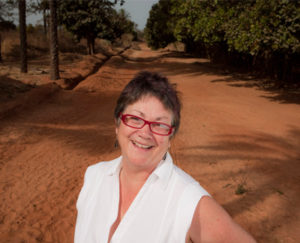“I love riding motorcycles,” says Andrea Coleman. She hails from a long line of enthusiasts: Her grandfather organized the U.K.’s first motorcycle race more than a century ago, and her father, uncle and brother all were racers.
Ms. Coleman began competing at age 19, three years after she started riding. Decades later, she’s focused on using the motorcycle in sub-Saharan Africa—not as a means of recreation but as a lifesaving tool.
Touring African countries in the late 1980s and early 1990s, Ms. Coleman saw patients being hauled to hospitals in wheelbarrows while poorly maintained vehicles lay in disrepair. Health workers walked for hours to reach remote villages—then had to cut short their time providing care so they could start their treks home.
Ms. Coleman and her husband, Barry (also an avid biker), thought motorcycles might help. Back home in the U.K., they mortgaged their house, raised money from the biker community and founded Riders for Health, which provides motorcycles to health workers and trains them in road safety and maintenance. “This is as much a part of health care as the white coat and stethoscope,” Ms. Coleman says.
The lack of reliable transportation “is a severe barrier and a bottleneck” to delivering health care in the developing world, she says. Supported by private donors, foundations and African health ministries, Riders for Health manages more than 1,400 motorcycles—usually the lightweight, robust and relatively low-cost Yamaha AG100 model—and other vehicles in seven sub-Saharan African countries, including Nigeria, Kenya and Zimbabwe. The group says it works with Gambia’s health ministry to run the country’s entire health-care fleet of more than 300 vehicles.
Hundreds of health workers rely on the group’s motorcycles to deliver basic care, including administering diagnostic tests for such common diseases as malaria, tuberculosis and HIV. Motorcycle couriers transport laboratory samples. Immunization rates have increased, specimen delivery time has fallen, and diagnosis and treatment have sped up.
The organization also trains health workers (women as well as men) in daily vehicle maintenance—checking fuel, brakes, nuts and bolts, which Ms. Coleman calls the essential, “dirty-hands bit of development” that leads to reliable transport.
Stanford’s Graduate School of Business recently finished a 2½-year study of the group’s impact in Zambia. Workers trained to use and maintain the bikes provided by Riders for Health conducted more outreach visits, traveled farther and served about 30 more people per visit than a control group of other health workers, the study found.
But Ms. Coleman, 67 and a mother of three, says she doesn’t see herself as a humanitarian. “I just want to see things done properly,” she says.
Source: Wall Street Journal



